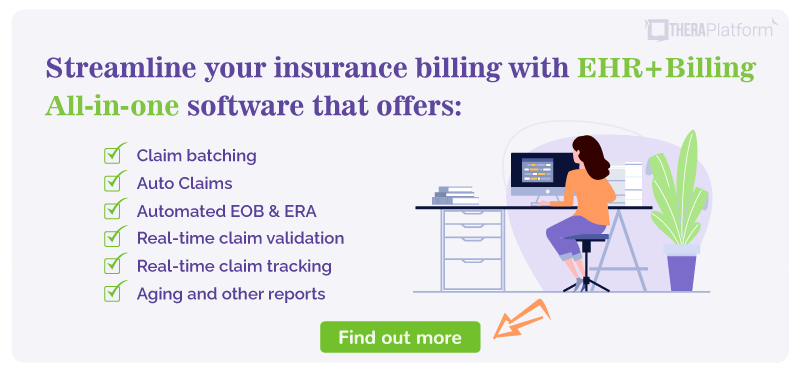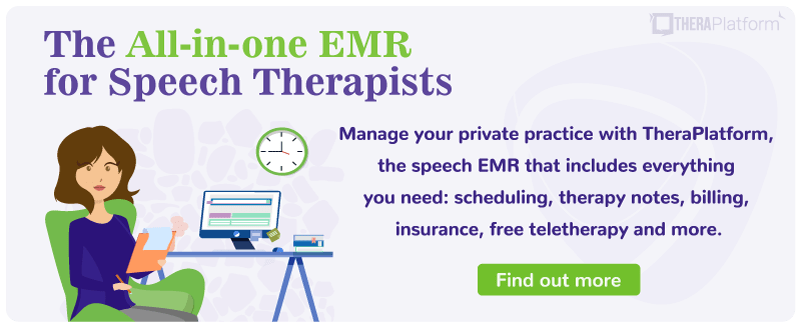92610 CPT code

92610 CPT code is a good code for speech language pathologists who specialize in Dysphagia (swallowing disorders) to know.
The American Medical Association (AMA) manages a uniform coding system that includes CPT codes. CPT stands for Current Procedural Terminology.
→ Click here to enroll in our free on-demand Insurance Billing for Therapists video course [Enroll Now]
CPT codes help ensure that documentation for services among various medical professionals across the United States have consistency. All codes contain five specific digits which refer to a given diagnosis.
When billing a therapy service for a client who has Medicare and Medicaid, therapists must attach the corresponding CPT code for the procedure to their documentation. This might be the treatment note or evaluation report. Private insurance companies may also require the use of CPT codes for billing purposes.

When speech language pathologists are familiar with CPT codes that are more commonly used within their scope of practice, documentation and billing are more efficient.
On the Centers for Medicare & Medicaid Services (CMS) website, therapists can view a list of current CPT codes.
Here’s an in depth description of one of the most important CPT codes for speech therapists who evaluate clients with feeding and swallowing disorders: 92610 CPT code or Evaluation of Oral and Pharyngeal Swallowing Function.
Let’s dive into who can bill this code, what services it includes, and when SLPs should use the code. We’ll also guide SLPs on how to bill 92610 CPT code correctly to ensure reimbursement and the best ways to stay current on updates to the code.
What is ICD code 92610?
The 92610 CPT code description is: Evaluation of Oral and Pharyngeal Swallowing Function. It should be used by Speech Therapists when billing a Dysphagia evaluation (also known as a Swallow Evaluation, Feeding Evaluation, or Swallow Study).
The evaluation should be focused on assessing a client’s feeding and swallowing abilities, which may include:
- Oral-Peripheral Evaluation: An assessment of the structure and function of the oral/facial musculature.
- Review of the client’s history: This includes any relevant medical diagnoses, surgeries, birth history, and medications taken.
- Behavioral observations of the client.
- Presentation of different bolus consistencies (foods and liquids).
- Assessment of the client’s skills during the oral and pharyngeal phases of swallowing.
- Client education and use of compensatory strategies/modifications (i.e., thickening of liquids or use of certain bottles with infants).
- Recommendations for client’s diet consistency and ongoing feeding/swallowing therapy.
Speech language pathologists can bill the 92610 CPT code. This code is not time-based, and may only be billed once per day.
According to ASHA, SLPs who are seeking to identify the most appropriate code for billing services should use the “best” code to describe the services they provide.
Here are some examples of procedures in which the provider can attach the 92610 CPT code to documentation and billing:
- A feeding evaluation with a child who is a picky eater.
- An infant feeding evaluation for a baby with a cleft lip/palate who requires modifications such as a different type of nipple or bottle.
- A swallowing evaluation with an adult client who is experiencing Dysphagia following a TBI.
Watch this video to learn common insurance billing struggles and solutions
→ Start My Free Trial
→ Start My Free Trial
How to use the 92610 CPT code
CPT codes can be separated into 2 categories: timed and service-based.
The 92610 CPT code is service-based. Because it is not timed, the code is intended to be used for a specific procedure that matches its description. The length of the treatment session does not affect the billing of this code.
Follow these steps to correctly bill for the 92610 CPT code:
- Refer to the AMA CPT manual. Be sure that the 92610 CPT code is the best, most appropriate code for you to use for the service you provided.
- Complete documentation for the evaluation (i.e., an evaluation report).
- Attach the 92610 CPT code.
- Another option is for the SLP to complete a superbill. This superbill can be submitted directly to the payor (ex: Medicaid, Medicare, or private insurance) or to the client.
- Automated billing can also be used. This easy and efficient way of billing with the 92610 CPT code is offered by TheraPlatform.
The SLP’s documentation for the evaluation should reflect that the client has a treatment diagnosis related to the description of the 92610 CPT code, such as the ICD-10 code R13.0 for Dysphagia, unspecified, or R63.32 for Pediatric Feeding Disorder, chronic. The assessment procedures targeted within the session should also relate to the areas outlined in this code’s description.
Here are some key points to remember, and errors to avoid, when billing the 92610 CPT code.
This can help reduce the likeliness of a reimbursement denial:
- Use the code for evaluation, not treatment.
- Do not bill using the 92610 CPT code more than one time in a day.
- This code can be used on the same day that a Dysphagia treatment was completed and billed. However, documentation must show that these were distinct and separate services. There must also be an established Plan of Care, and the treatment session in which the SLP bills the 92610 code must address the goals outlined in the plan of care.
- The 92610 CPT code should not be confused with the CPT Code 92611: Motion fluoroscopic evaluation of swallowing function by cine or video recording. That code should be billed with the radiology procedure 74230. Typically the 92610 code is reported prior to the 92611 being billed.
Reimbursement for CPT code 92610
ASHA’s Medicare Fee Schedule for Speech-Language Pathologists is a helpful source that can guide SLPs on which CPT code to use and current reimbursement rates.
The national fee for 2023 for the 92610 CPT code is $83.64.
Reimbursement rates of private insurance payers vary according to specific plans. Determining whether the client’s insurance plan covers Speech Therapy (including sessions in which the 92610 code is billed) for their specific diagnosis is important. Verify this, and encourage your client to do so as well, prior to initiating services to maximize reimbursement for this code.
This fee may or may not be similar to a private provider who does not accept insurance. Sometimes those providers choose to set their prices for services to be similar to Medicare or Medicaid reimbursement rates.
Coding changes
Clinicians should stay current on updates to CPT codes, which are performed periodically. This is important because changes may affect the way the clinician bills for services.
Recent changes affecting the 92610 CPT Code
In 2022, two new ICD-10 codes were added for pediatric feeding disorder (PFD); R63.31, acute PFD and R63.32, chronic PFD. According to the American Speech-Language Hearing Association (ASHA), the CPT code 92610 should continue to be used to report an evaluation for a client with a PFD.
Failure to comply with current requirements or not using the most appropriate CPT code can result in insurance denials or delayed reimbursement for services.
SLPs can remain up to date with changes to the 92610 CPT code by checking the AMA’s CPT codebook when updates are made. CPT codes are updated by the AMA annually and are effective for use on January 1st of each year.
The 92610 CPT code is important for Speech Language Pathologists who work with children and adults with feeding disorders to be familiar with. By staying current on what types of treatment the code includes and when to use it, providers can have more assurance that they’re following AMA guidelines and will receive reimbursement for services.
Start 30-day Free Trial and explore TheraPlatform. HIPAA Compliant Video and Practice Management Software for Therapists.
How EHR and practice management software can save speech therapists time on insurance billing
EHR with integrated billing software and a clearing house, such as TheraPlatform, offers speech therapists significant advantages in creating an efficient insurance billing process. The key is minimizing the amount of time dedicated to developing, sending, and tracking medical claims through features such as automation and batching.
What are automation and batching?
- Automation refers to setting up software to perform tasks with limited human interaction.
- Batching or performing administrative tasks in blocks of time at once allows you to perform a task from a single entry point with less clicking.
Which billing and medical claim tasks can be automated and batched through billing software?
- Invoices: Create multiple invoices for multiple clients with a click or two of a button or set up auto-invoice creation, and the software will automatically create invoices for you at the preferred time. You can even have the system automatically send invoices to your clients.
- Credit card processing: Charge multiple clients with a click of a button or set up auto credit card billing, and the billing software will automatically charge the card (easier than swiping!)
- Email payment reminders: Never manually send another reminder email for payment again, or skip this altogether by enabling auto credit card charges.
- Automated claim creation and submission: Batch multiple claims with one button click or turn auto claim creation and submission on.
- Live claim validation: The system reviews each claim to catch any human errors before submission, saving you time and reducing rejected claims.
- Automated payment posting: Streamline posting procedures for paid medical claims with ERA. When insurance offers ERA, all their payments will post automatically on TheraPlatform's EHR.
- Tracking: Track payment and profits, including aging invoices, overdue invoices, transactions, billed services, service providers
Utilizing billing software integrated with an EHR and practice management software can make storing and sharing billing and insurance easy and save SLPs time when it comes to insurance billing for therapists.
Resources
TheraPlatform is an all-in-one EHR, practice management, and teletherapy software built for therapists to help them save time on admin tasks. It offers a 30-day risk-free trial with no credit card required and supports different industries and sizes of practices, including speech-language pathologists in group and solo practices.

More resources
- Therapy resources and worksheets
- Therapy private practice courses
- Ultimate teletherapy ebook
- The Ultimate Insurance Billing Guide for Therapists
- The Ultimate Guide to Starting a Private Therapy Practice
- Insurance billing 101
- Practice management tools



